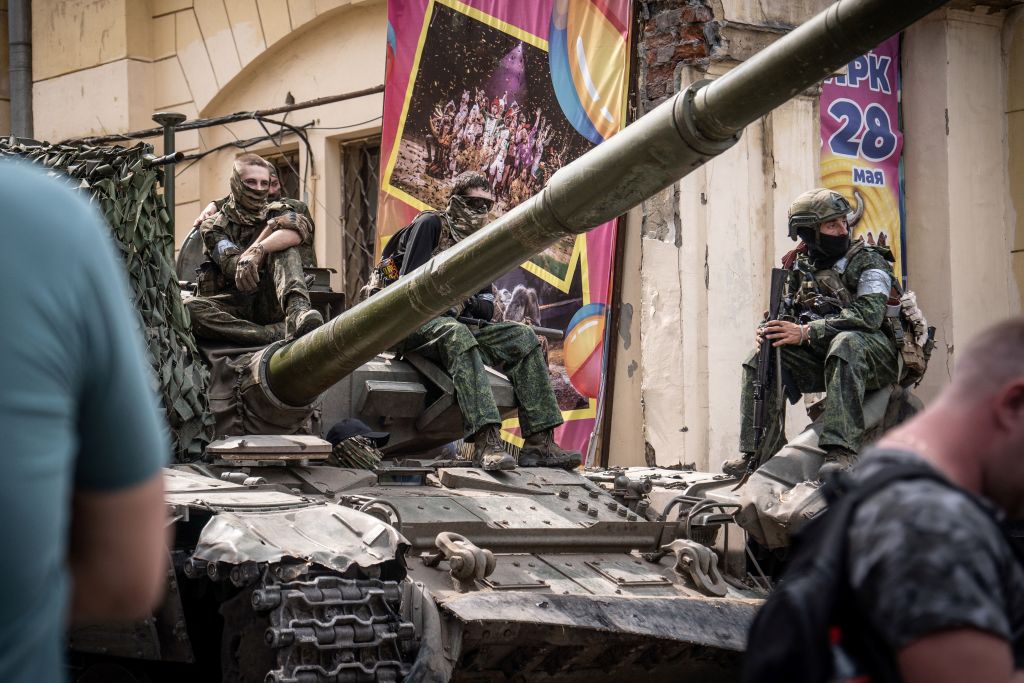
Almost 82 years to the day since Hitler’s invasion of the Soviet Union began what Russia calls the ‘Great Patriotic War’, a more modest invasion, orchestrated by one of Vladimir Putin’s close associates, claimed ‘patriotism’ as its motivation and justification. Both ended in defeat.
The consequences of Yevgeny Prigozhin’s short-lived mutiny—explicitly against Russia’s military leadership but, implicitly, targeting Putin—are yet to crystallise.
Despite the perils of political forecasting in relation to Russia, some early outlines are evident.
First, Russia’s political landscape has changed fundamentally, with Putin’s uncontested reign over. His hitherto unquestioned authority is compromised, perhaps fatally. Facing the constitutional requirement to declare in November if he is running for re-election as president in March 2024, he now is damaged goods, and badly damaged at that.
As the capo di tutti i capi—‘boss of all bosses’—Putin has ruled for 23 years without challenge. The ultimate bestower of largesse, the man who both giveth and taketh away, he has refined an inherited system of patronage and persecution, ensuring that no member of the elite (each anointed by him) could gain power and influence in more than one area. The siloviki—those sprung from Putin’s own intelligence and security background—were played off against the uber-wealthy business elite oligarchs, in turn being balanced by those with their technocratic hands on the levers of government. Putin has been the final arbiter of all decisions of any note in a system that has become completely personalised around him.
Now, one of his own—albeit an outsider he brought into his sanctum—has turned on him, exposing the brittleness of the Kremlin’s Byzantine system. That will reinforce the misgivings that others clearly feel about Putin’s ability to steer Russia into the future by seeking to recreate its long-lost, and unrecoverable, imperial past. The incontestable failure of Putin’s personal war in Ukraine underscores these doubts.
Second, the breathtaking hypocrisy of the Kremlin is on full and jarring display. Putin and his docile Duma (parliament) dominate a system that persecutes even tangential questioning of the war in Ukraine. It arrests pensioners for appearing on the streets holding a blank sheet of paper, not to speak of incarcerating those who have voiced full-throated opposition to their president’s egomaniacal quest for stale glory. Yet the man who led an armed mutiny against the state, an act decried as ‘treachery’ and ‘a stab in the back to our country and our people’ by Putin in his public address (in which he displayed barely suppressed and uncharacteristic fury at Prigozhin’s personal betrayal) essentially is let off. His armed subordinates are promised clemency and protection so long as they submit to the authority of the Ministry of Defence. This Orwellian double-speak should still the voices of those congenital naysayers and credulous and cretinous Putin boosters—including in Australia—who would discern the ‘black hand’ of the West as the root cause of all Russia’s travails. But I fear it won’t.
Third, Putin has been personally humiliated. For him, this is the bitterest pill. It bodes ill for Prigozhin. Some might wonder if the whole affair were not confected—a ploy of the two ‘Ps’ to expose possible disloyalty in the elite at the height of an existentially important conflict, not just with Ukraine, but, as Putin would contend, ‘the West’. I have learned over 40 years studying Russia and its politics, people and culture that even the improbable is possible in Russia. So, I asked a well-connected, experienced and authoritative friend in Moscow for his view. He dismissed that thesis out of hand. His trenchant reply was: ‘No, it was panic. To shoot or not to shoot?’
Fourth, Putin’s future will not be settled in days or weeks. He presides over an ecosystem in which mistrust and deceit prevail and self-interest rules. The failure of key political figures in the Duma, or elite entities like Rosgvardiya—the praetorian body of some 400,000 well-armed troops personally subordinate to Putin (incidentally, like the intelligence services and key organs of state authority)—to take an official public position reminds me of an old Russian saying: ‘To be close to the tsar is to be close to death.’ Trying to second-guess the boss is fraught with personal risk. The first person to ‘jump the bags’ might find no-man’s land a very barren place. The coming days and weeks will reveal whether Putin will use this scare to conduct a purge of the elites.
Seventy years ago, Stalin would have simply shot 10,000 people, confident that everyone else would draw the appropriate conclusion. What we have so far is an interim solution that is likely to prove as secure as an old band-aid. Putin’s public fulminations and his vow that the mutineers would be severely punished notwithstanding, Prigozhin allegedly has been allowed to relocate to neighbouring Belarus (notably, part of the ‘Union State of Russia and Belarus’), and his warriors have been promised protection and amnesty if they had not participated in the mutiny and dutifully regularise their status with the Ministry of Defence. At this point, it’s hard not to recall the assurances Russia gave Ukraine in the 1994 Budapest Memorandum ‘to respect the independence and sovereignty and the existing borders of Ukraine’. And, given Putin’s reach and Prigozhin’s background, wouldn’t the Central African Republic be a safer bet?
Putin does not forget and, more importantly, does not forgive, betrayal. We saw that in the cases of the KGB defector, Alexander Litvinenko, and Sergei Skripal from the GRU, both of whom were the targets of Kremlin-sanctioned poisoning during Putin’s rule. When betrayal is compounded by humiliation, the result is toxic. If Prigozhin drinks tea, he may well want to change his beverage of choice.

